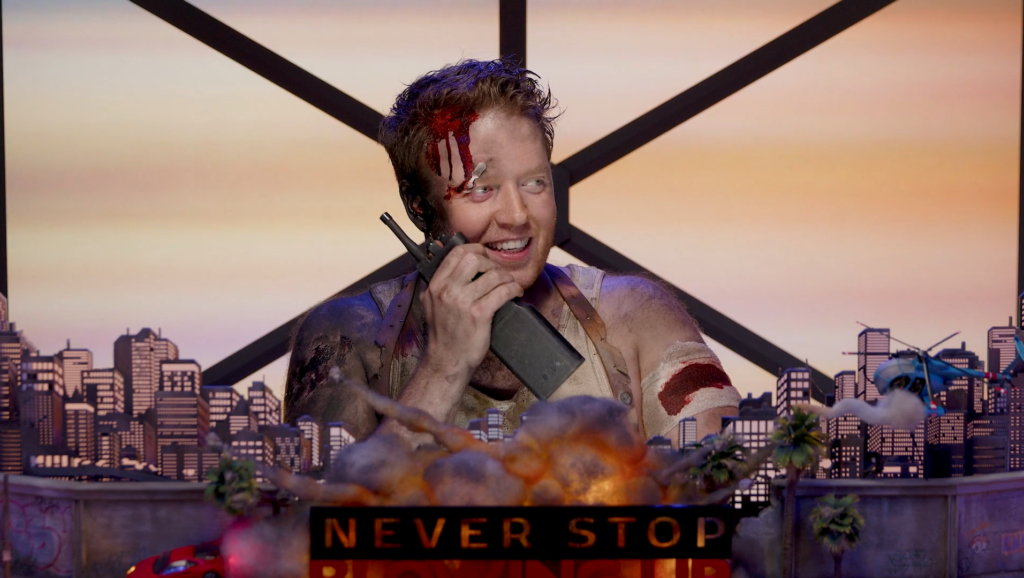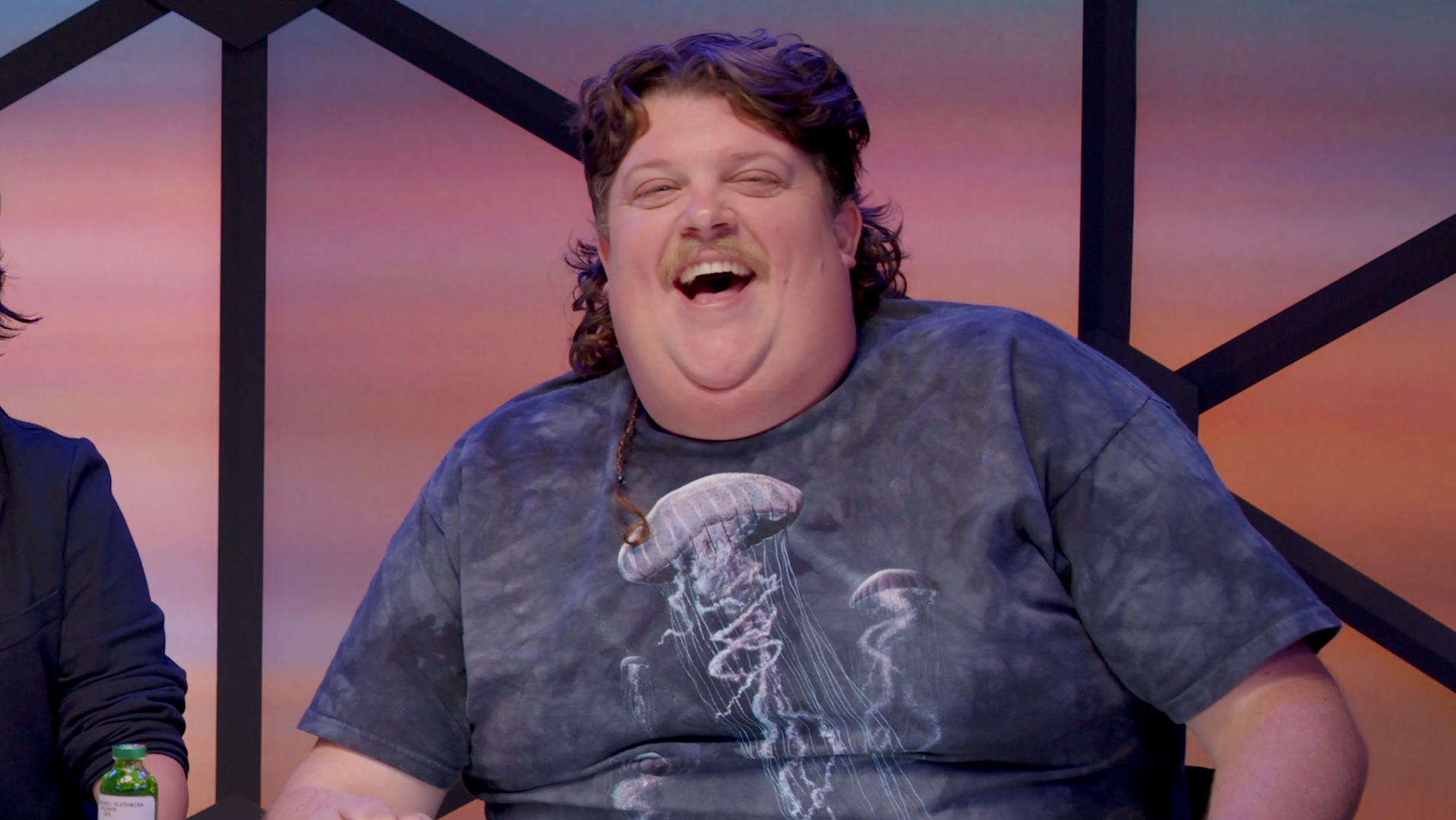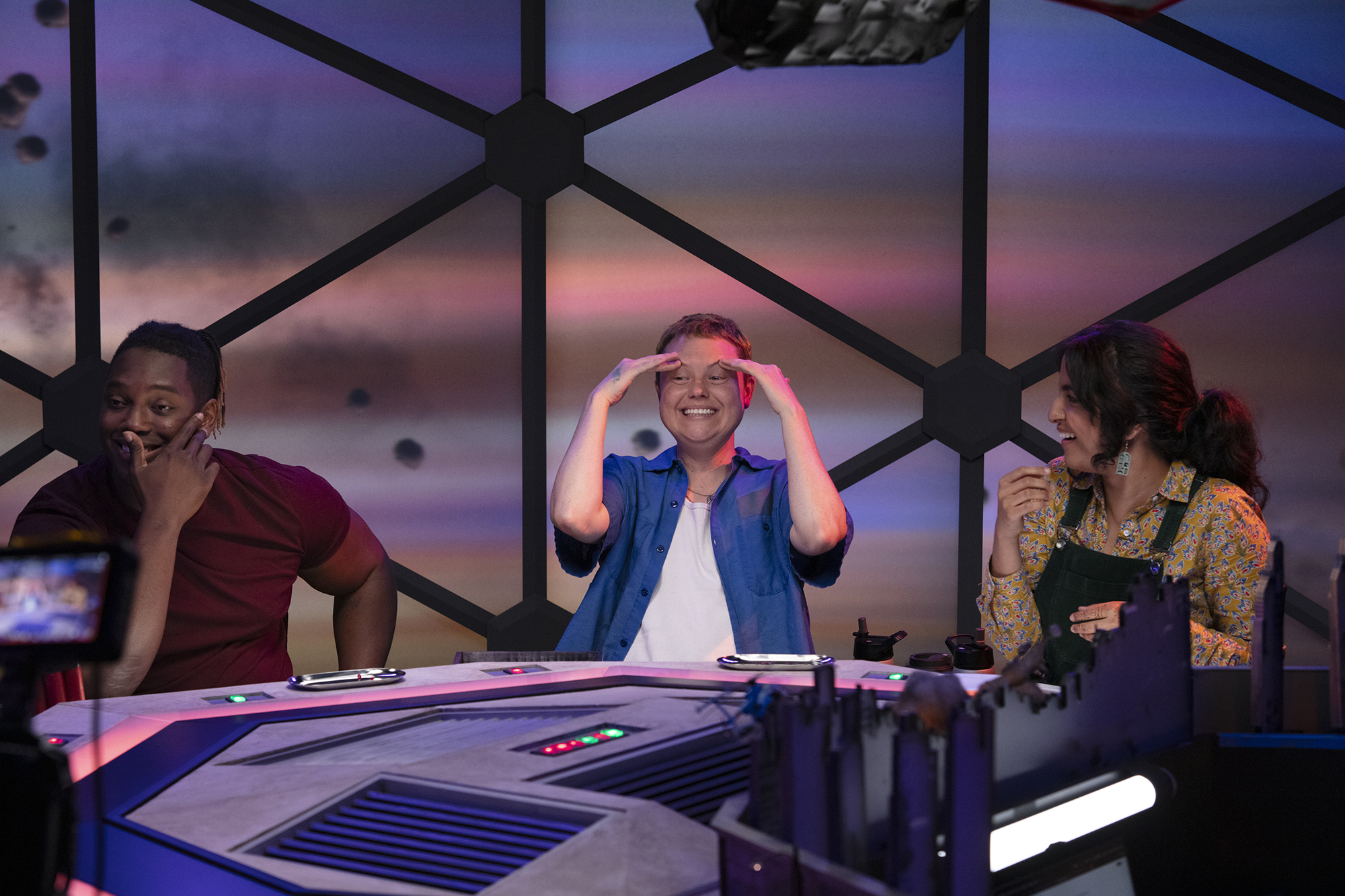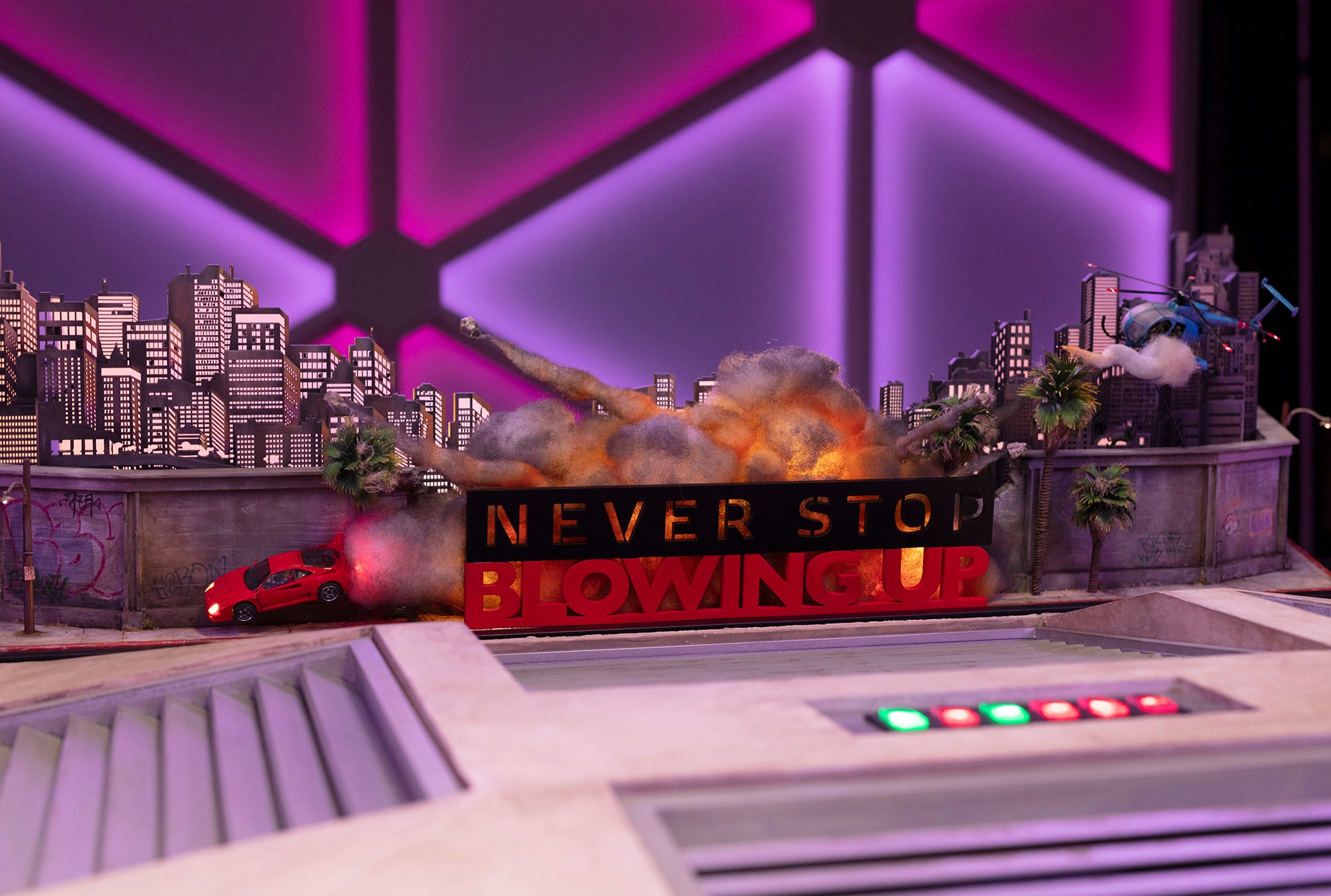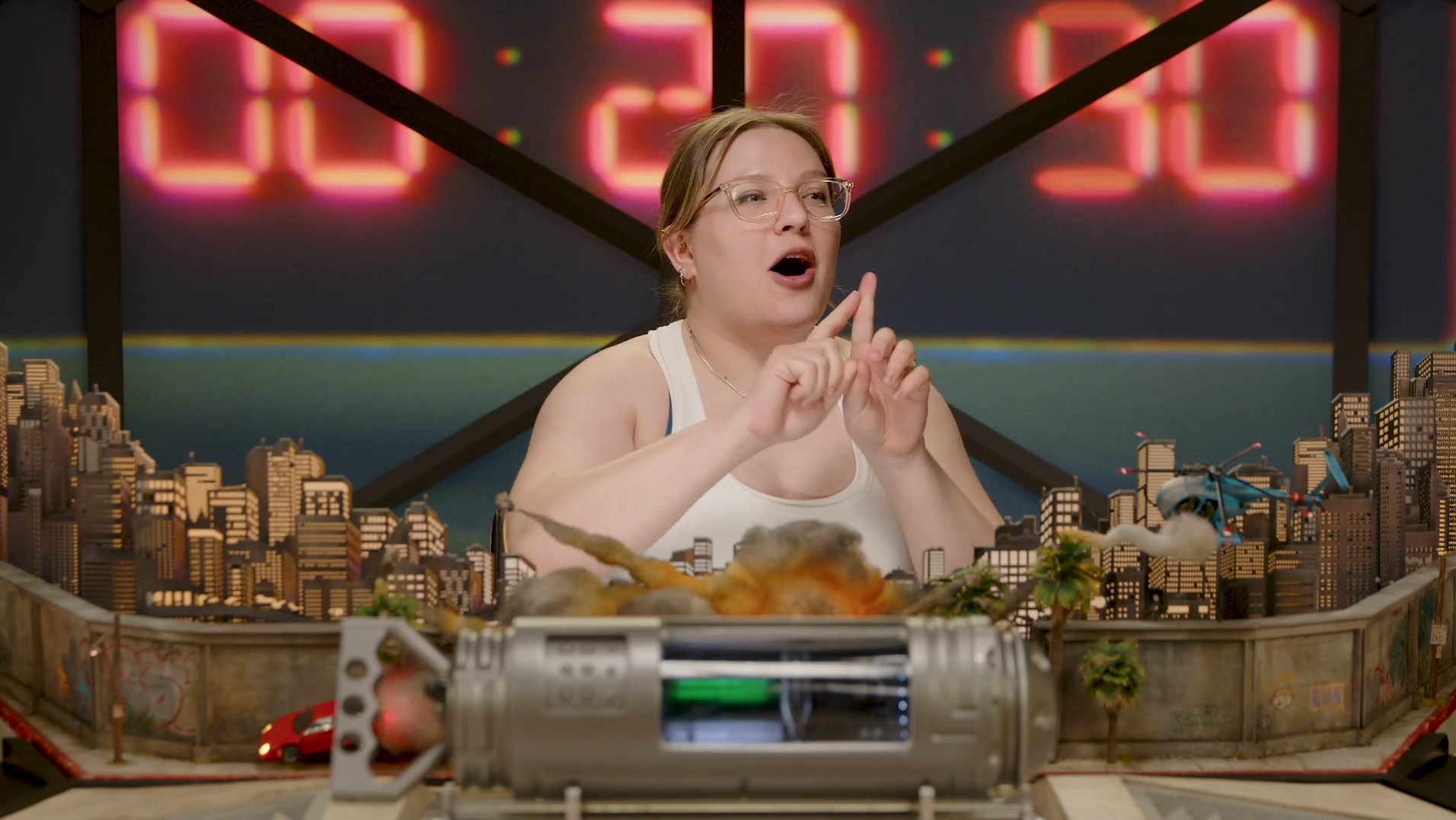Never Stop Blowing Up was always going to be one of Dimension 20’s most outrageous series.
The homebrew game designed for the occasion combined Kids on Bikes with a simple yet compelling dice game. It was a starting place that guaranteed hijinks — the system encourages players to go for ridiculous checks, on the chance that they “blow up” their dice and instantly get stronger.
Then you have the over-the-top ’80s action movie setting, embracing the excesses of a genre where just about anything goes — cars that reach 5,000 miles per hour, gangs that travel via super fast backflipping, a White House that takes off like a jet plane, a talking jaguar named Tony.
Throw in six of Dropout’s funniest cast members, each of whom seems to be trying to top the rest in their efforts to do The Most Ridiculous Thing Possible? Pure gold.
The trials and tribulations of the employees of Dave’s Video Store who got pulled into the ridiculous, fast-paced world of the fictional movie Never Stop Blowing Up entertained Dropout fans for the past two months, with a 10-episode season that earned its place in the pantheon of Dimension 20’s greatest hits.
Polygon caught up with game master Brennan Lee Mulligan about the season. Mulligan went deep with us about the cast, the themes of the season, whether you can expect to play Never Stop Blowing Up at home anytime soon, and the chances of a second season. We also talked to the cast of the show — you can expect that chat later this week.
This interview has been lightly edited for length and clarity.
[Ed. note: We talk about major plot points from Never Stop Blowing Up, including the ending.]
Polygon: Well, Brennan, what a fun season of Dimension 20, and what an incredible cast. What was it about the makeup of the cast that you were most excited about?
Brennan Lee Mulligan: We wanted to find a group of people that had a love for this genre, had the ability as improvisers to take fearless, bold, enormous swings, and people who can fully jump the tracks in terms of tone and comedy and mood, and pirouette 20 times in midair, and then land on another set of tracks somewhere else. And so we just found these six improvisational all-stars who are just deeply beloved at Dropout, and it was a joy and a privilege to work with all of them.
Everyone in the cast had at least some experience with a Dimension 20 season besides Jacob Wysocki. What did Jacob bring to the dome in his first time?
It’s very fun to be blown away by somebody and then also be like, Of course, of course you’re this. You know, Jacob’s reputation precedes him. He is such a brilliant performer in a season that was all about big swings and goofiness. What really stuck out to me about Jacob was for someone whose training is very [much in] long-form improv comedy, he locked in to the heart of his character in so many ways. Dang stays as this emotional core of the season who is, in many ways, the most affected and grows as a character throughout the season. That scene with Wolfman Ann, which Jacob very much called for — Jacob was like, I am having an emotional low point now — I just thought was so special, and I was very grateful for his dedication to not only the big comedic swings, but having this point of view, an emotional North Star that kept his character’s journey grounded even while the most outrageous stuff was happening around him.
He’s obviously very funny, but Jacob’s also a very gifted physical actor as well. And I was struck by how much he was able to work that into the season, despite it being a setting where you’re all sitting around a table.
That monologue where he’s like, “My mind is not deep. Wide, not deep. There’s 15 governments, and they’re bad.” [Mulligan does Jacob’s hand motions while quoting this.] To see the joy of someone struggling with the convoluted action movie plot of, The people that hired us are betraying us. It was a double blind but they’ve been betrayed by the betrayers. And you’re like, What the hell? Like, it seems like you’re just trying to set up a car chase in Monte Carlo. That’s fine. He played that so well from that character point of view.
You brought it full circle there with the extra copy of the Never Stop Blowing Up VHS under his chair. How’d that come together, and was it always going to be Jacob’s chair?
It was always gonna be his chair. That was from [producers] Rick Perry, Carlos Luna, Michael Schaubach, and me talking. We’re an incredibly collaborative set. So at some point that VHS is floating in the ether. I think Schaubach had already maybe shot the mini or the insert of it. And then we went, “Rashab! Him! Under the chair.” And he pulled it out. It was just such a fun moment for Jacob, as a character who, in some ways, it was like his life had been so stalled out. And then to be like, “You were right!”
You talked about the big comedic presences this season. How would you describe trying to wrangle this group as a GM? Because there were a lot of situations where things went a little off the rails, and sometimes you leaned into it.
That’s a very funny thing. There’s different strategies, right? I enjoyed seeing the moments where I had to pull up and be like, We are moving on. What’s so funny is if I’m looking at my own boundaries, what I realized was I fully surrendered as GM Brennan, and then producer Brennan was the one who had to come in. GM Brennan was like, I’m in the craziness with you! We’re not going down the rabbit hole. We’re being fired from a cannon through the rabbit hole at top speed. I’ll be just as crazy as you! Backflipping Sidewinders, let’s go! I was so ready to meet them there. And then every once in a while, a version of Brennan would lock in and be like, We have to leave this scene, this scene we’ve been in for 40 minutes. It’s time to go. And that was the one who came in, and I can’t believe I’m saying this, and told my (at the time) pregnant wife to shut up, on camera. A real low point for me. Izzy was laughing through it, but I look back at myself and I’m like, Well, when I have my soul weighed against a feather at the end of my life, this is going to be one of the lowlight moments for sure. So that was a fun moment.
The point was not to wrangle anybody. I think that the fact that the cast is feeling limitless joy and is in that place of play is a success of the show. And if that means I need to be the one to load everyone back on the tour bus and go to the next place, so be it, right? Like, great. Everyone’s having such a ball that no one’s got an eye on the clock but me. Cool, that’s perfect. That’s exactly where we need to be. That is my job, right?
In terms of making the decisions about how far people can go, you had some tough choices in terms of DC checks for some of the more ridiculous things that happen. Thinking back on it, how do you weigh Usha’s attempt to throw G13’s oily shirt in front of the car to speed it up versus Kingskin’s manual brain surgery on G13? How do you make those decisions of what is possible if the dice roll the right way?
There’s a very funny ongoing game that me and Rekha Shankar have with each other. What’s funny is a lot of Rekha’s choices that I will set an impossibly high DC for, once you’re going 5,000 miles per hour in a car, what is logic or consistency? It’s more about a fun character game that I think me and Rekha have about tone and moments of Rekha having a gremlin energy, of wanting to introduce a component into the genre of the world that I have to balk at. So in other words, if Rekha had gone like, “I want to make the car faster, I’m going to find a hidden button that, like, splits an atom made out of other split atoms, and it creates a super atom,” I would probably set that DC at, like, a 20. But it’s the fact that Reika goes like, “Can I get my shirt off like a Donkey Kong banana?” …Pete, correct me if I’m wrong. Even in cartoon logic…
I don’t think Roadrunner would get away with that.
I don’t think Roadrunner would get away with that! What I’m saying is, in what cartoon does taking a slippy thing and throwing it in front of a car make it go uncomplicatedly faster? You know what I’m saying? That’s like, I hit you in the face with a banana cream pie, and you’re cleaner than you were a second ago. Let me just fully describe to your readers. I move away from the camera, shake my fists and go “Rekha!!!!” That’s the relationship that me and Rekha have. It’s the fun of Rekha doing things that feel like an active fun butting of heads in the genre about the choices that are being made.
What did you enjoy the most about the setting of the over-the-top ’80s action movie, as a GM?
I think that there is a freedom and a joy. The last episode of Never Stop Blowing Up is our 250th episode of Dimension 20. And I think you want to set new creative challenges for yourself all the time, just to keep things fresh. And looking at the programming slate, you know, we were coming off Fantasy High: Junior Year, which is our first threequel. It’s our first third installment in a core season. And you know that Junior Year, of course, has totally outlandish things. I mean, my god, Blimey, you know? But it also was dealing with these themes of stress and rage, and there’s a groundedness to Elmville and the Aguefort Adventuring Academy.
Especially shooting the season with Izzy being eight months pregnant, I was preparing. We shot 50 episodes of Dimension 20 in nine months because I was trying to shoot out before my paternity leave. So I think that from a programming level, it’s like a photographer being like, “All right, do a fun one, do a crazy one,” right? And for me as a GM, I was gearing up for this sprint before paternity leave. As a creative challenge, let’s set ourselves up for something that embraces chaos and fun and honoring as many huge swings as possible, for the timing, for the production team’s bandwidth. Let’s not do a tactical mini season. Let’s do a season where we’re doing hand props and makeup and these fun looks. And so there are the creative choices that go into selecting a concept for a season that are made holistically within the umbrella of the entire show, to present new things to our audience, to keep the anthology fresh, to give people a flavor they’ve never had before. That was really a lot of what went into Never Stop Blowing Up.
One of the season’s more surprising mechanics was the ability for players to jump in the GM chair. What sparked that idea, and how do you feel about the result?
I loved the result! The players were so generous and exciting, and I couldn’t ask for a better leader of that vanguard than Ify — his contributions were so fun, and he’s such an exciting storyteller. Also a dream to have Rekha and Izzy, and our unborn child, sit in the hot seat! What a dream!
The players made a lot of big choices throughout the season, but were there any that particularly surprised you?
Every player surprised me! From Ify’s establishing of Vic as a guardian spirit, to Rekha elaborating on that with the menace of G13 — Jacob’s emotional depth with Dang and Wolfman Ann, to Alex’s awesome turn with Liv wanting to do her own thing! Was such a joy to watch Ally take the lead as a plot hound, and Iz to run both the divorce storylines side by side!
What would you adjust with the Never Stop Blowing Up system for the 2.0 you talked about throughout filming, and will there be a release of the game itself?
We would love to. We’re exploring that right now. We would probably close the infinite token loophole that Ify found, tighten that up a little bit, clean up one or two other things, maybe clean up some of the group abilities a little bit. But probably we would want to release it to people. And then not do a full revamp until some playtesting. The funny thing about even running this stuff on camera is that actual plays are not a big enough sample size. Every game master, Dungeon Master, storyteller knows this, the balance required for your table actually does require way less scrutiny than the balance for published material.
As a case in point, you have two different character builds. One of them is more powerful than the other, but the more powerful one is being played by a newer player who has less ability to make optimal choices than a theoretically worse build being played by a veteran player. And so you don’t need to adjust that, you’re like, Actually, the balance of these encounters come out in the wash pretty even, people feel like they’re doing awesome stuff, people are really happy with their builds and their characters. So the standard for published material is just on a totally different level than the tomebrew that a GM or a DM is bringing to their table because of the sample size. How many encounters, even in a long home game, are you really going to play? We would probably want to do a full revamp, actually, after an alpha playtest where we released it to a lot of people and got feedback.
The ending leaves open the possibility of the characters returning to the world of Never Stop Blowing Up. Would you be interested in that for a future D20 season?
I love this world so much — would be delighted to play with everybody again as often as they’ll let me!
Never Stop Blowing Up is available to watch on Dropout.

